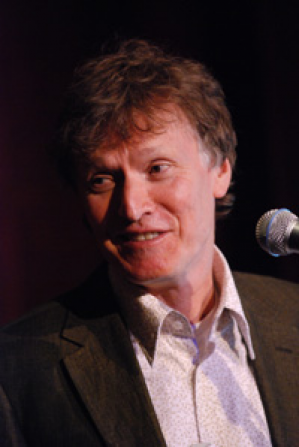
Steve Winwood @ Berklee College of Music
May 30th, 2008
Berklee College of Music, Office of Communications
By Lesley Mahoney
With a grandfather who sang and played the church organ and fiddle; a grandmother who played Victorian parlor songs; a father who played saxophone, clarinet, bass, and drums; and three musician uncles, Steve Winwood couldn't exactly help but take a liking to music.
"I started to pick up tunes, using various instruments left around the house: double bass, drum kit, piano," he told a packed audience at an afternoon clinic held at Cafe 939-one of several appearances during his visit to Berklee. That evening, he played a sold-out gig at the Berklee Performance Center, the next night, he joined student Rebecca Muir onstage to perform his hit "Roll with It" during the commencement concert, and at the commencement ceremony the following morning he received an honorary doctorate from the college. Winwood, who is currently on tour for his new album Nine Lives with Tom Petty and the Heartbreakers, told the rapt group at the clinic how he got into the business.
Growing up near Birmingham, England, he pursued guitar and piano lessons. But playing dual instruments didn't sit well with the principal of the Birmingham Midland Institute, which Winwood attended briefly. "He didn't like the fact that I was playing piano and guitar," Winwood recalled. When asked what kind of music he liked, Winwood got an even icier reception. "I said, 'I like Igor Stravinksy, Fats Domino, and Ray Charles.' In Europe and England, music education was very traditional. It was quite frowned upon to even consider the seriousness of anyone like Fats Domino or Ray Charles. Now, it's probably OK, but in the early '60s, it was not accepted. [The principal] said, 'Either forget Fats Domino and Ray Charles or leave the college."
That was Winwood's cue to do the latter. "As it happened, I had a few gigs around town. It was just what I needed to get out," he said. Winwood, of course, had an early start to his career, joining the Spencer Davis Group at age 15, then going on to form Traffic and later Blind Faith, and ultimately launching a wildly successful solo career, which continues to this day.
Having experienced a confining music education program, Winwood appreciates the breadth that Berklee has to offer. "The reason I'm very happy and honored to come here and talk to you today is because when Lawrence Berk started this school, he was probably in the same situation that I was. I think Berklee offers a fantastic opportunity for young people to learn," he said. "There's a wealth of wonderful music in the serious classical world, but I think there's an absolute necessity for an alternative. So I'm very happy that Lawrence Berk created this school, what is now an internationally known school for contemporary music."After recounting his beginnings in the business, Winwood fielded questions from the audience and the moderator, graduating senior Jared Braverman. The result was valuable advice culled from his wide-ranging career, a warm-up to his BPC concert and honorary doctorate acceptance.
On collaborating:
"I spent a lot of time in the '70s working on other people's projects. I had a wilderness period of my own during that time. I learned a lot about making records, the constructions of songs and music, ways to play. Jimi Hendrix [with whom Winwood collaborated] had a background of backing up people, of being an accompanying musician. That's very valuable in enabling you to then take the front. I think you need to have the knowledge of how the rest of it works before you take the front."
On getting a degree:
"[Coming to Berklee] is full circle for me. It's the most marvelous thing that could happen. The music industry has changed a lot. I've been very lucky. When I started, there was probably a lot less competition in the world. So that enabled me to get a foothold in playing with a lot of bands."
On his recent album Nine Lives:
"The album was written and conceived in an old-fashioned way: getting musicians together in the studio and recording it. I came to songwriting because I'm a musician first and foremost. Because of the time in the late '60s/early '70s, it was necessary to write songs as a vehicle for us to play. It's still pretty much the same."
On songwriting:
"There are some things that don't change, and I think songwriting is one of them. There's never any formula for writing songs. Whenever you think you've cracked it and know how to write these songs, something will teach you that you actually don't. There's always going to be another way of writing a song. I think it's good to be familiar with all different avenues of songwriting, because if one doesn't work, you've always got another one."